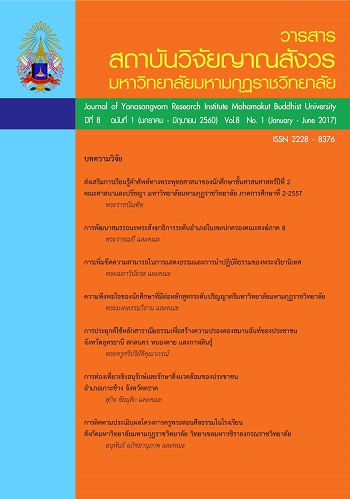Transformation Leadership’s Model for the Head of Department Private in University
Main Article Content
Abstract
The research objective of the research is to 1) to find the leadership change of the head of the Department of private University 2) to study the strengths and points that should be developed of the head of the private Universities The head of private universities in the number of 220 persons. Random sampling technique, no layer ratio. Data query. Statistical analysis is the mean, standard deviation, skewness, right, confirmatory factor analysis. The findings conclude that 1) experts agreed with the form of transformational leadership at the head of the private University was developed both 7 elements as follows. With the vision to create inspiration, intellectual stimulation, to consider individual characteristics leader to transition. The strategy to achieve the vision is of great importance to the leadership style of the head of 2) elements of major change leader has practical feasibility level, more and more than 80 percent of most all. 3) transformational leadership has construct validity (χ 2 = 20.19; DF =, =, 13 P. 091 GFI =, =, 976 AGFI. 948 RMR =. 008). 4) and head of the brush the transformational leadership is the conversion of ( = 4.106) and points that should be developed, the intellectual stimulation. ( = 3.809).
Article Details
References
ปรัชญา มะลิหวล (2555) การศึกษาความสัมพันธ์ระหว่างภาวะผู้นำการเปลี่ยนแปลงกับประสิทธิผลการบริหารงานวิชาการของผู้บริหารสถานศึกษา ในสังกัดสำนักงานคณะกรรมการการอาชีวศึกษา จังหวัดนครราชสีมา
สำนักงานคณะกรรมการการอุดมศึกษา สำนักนโยบายและแผนการอุดมศึกษา. (2551). กรอบแผนอุดมศึกษาระยะยาว 15 ปี ฉบับที่ 2: 2551: 281. กรุงเทพมหานคร: จุฬาลงกรณ์มหาวิทยาลัย.
สำนักงานคณะกรรมการการศึกษาขั้นพื้นฐาน เหลียวหลังแลหน้า ปฏิรูปการศึกษาขั้นพื้นฐาน 29 มกราคม 2558.
อรัญ มูลบุญ. (2557). ปัจจัยภาวะผู้นําการเปลี่ยนแปลงของผู้บริหารสถานศึกษาที่ส่งผลต่อ ประสิทธิผลการ บริหารงานวิชาการในโรงเรียนสังกัดสํานักงานเขตพื้นที่การศึกษามัธยมศึกษาเขต. วารสารคณะศึกษาศาสตร์ มหาวิทยาลัยมหาสารคาม (ฉบับพิเศษ).
Hair, J. F., Black, W. C., Babin, B. J., & Anderson, R. E. (2010). Multivariate data analysis: A global perspective. (7th ed). New Jersey: Pearson Education Inc.
Hoy, Wayne K., & Miskel, Cecil G. (2005). Educational Administration (7th ed.). New York: McGraw-Hill.
Kouzes, J., & Posner. B. (1995). The Leadership Challenge: How to Keep Extraordinary Things Done in Organization. San Francisco CA: Jossey-Bass.
Tichy, N.M. and Devanna, M.A. (1990). “The Transformational Leader,” Training and Development. 19(11).


